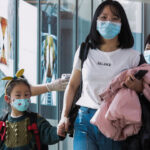
The Lagos Urban Studies Group (LUSG), University of Lagos, in conjunction with the Nigerian Slum/Informal Settlement Federation (NSISF), has identified community-led interventions and mechanisms for amplifying slum voices and promoting advocacy towards improved responses to COVID-19.
The bodies, which undertook a study titled: “Giving Voice to Slums: Creating Digital Urban Platform for Community Self-Reporting Amid COVID-19,” said in terms of knowledge, findings indicate poor knowledge of COVID-19 and the availability and pick up times/points for emergency support packages among slum dwellers occasioned by the communication strategy/channels of information used by government.
According to the study, findings indicate that radio, television, Facebook and WhatsApp platforms are slum dwellers’ preferred communication media.
Principal Investigator on the project, Dr. Peter Elias, who spoke during the unveiling of the policy brief, yesterday, in Lagos, said people who live in the slums do not have access to decent and quality housing and generally could not access basic services, such as water and sanitation, which are critical to COVID-19 prevention.
Elias said majority of the respondents were self-employed which means that they mostly relied on daily income for their sustenance; and were struggling to eke out a living during the lockdown, an indication of absence of palliatives and supports from the state or non-state actors, which could have encouraged strict compliance to the lockdown guidelines.
He said the respondents of the study were forced to violate lockdown regulations to secure means of livelihood due to non-availability of support systems, especially for workers in the informal sector of the economy.
Given that research findings provide feedback to the government on policy options in situations of national/global emergencies; and provide direction for future interventions, especially when decisions related to the government’s response to pandemics are involved, Elias recommended that government should not only adopt strategic communication approach but work with risk communication experts to design a risk communication strategy for prevention and response/share information accordingly.
Also he said message design should be evidence-based and done by experts for synergy in messaging across media platforms aimed at effective communication. In addition, the government should invest in knowledge sharing activities and build the capacities of local authorities/citizens to sensitise slum dwellers during emergencies and disasters.
“These hopefully will give voice to slum dwellers and enhance community self-reporting among slum dwellers during disasters and emergencies aimed at helping duty bearers to understand the socio-economic conditions, health behaviours and risk factors which may adversely impact lives and livelihoods systems of slum dwellers during emergencies and intervene to prevent and contain diseases.”
He said the government should Invest in the provision of basic services such as water and sanitation, a strategic intervention to COVID-19 prevention, not discounting other diseases so that when messages on hand washing as a means of disease prevention is shared, adoption will not be hampered In preparation for future emergencies.
Elias said the Government should also map slum/hard to reach areas and design a strategy for the disbursement of funds or resources to slum dwellers to ensure fair and equal distribution of relief materials regardless of dwelling place.
Head, Environment and Ecology, Lagos State Resilience Office (LASRO), Adebayo Ade-Ojo, said the agency has initiatives that are designed for blighted communities adding that the importance of the study is helping the agency in the implementation of the inquisitive pillar, which falls under a strategy by the agency.
Ade-Ojo said this is another commendable programme where there are pockets of community based programme initiatives, which can only add up to give big results.
He said what the government has decided to do now is to engage communities through Community Development Areas (CDAs) registered with the Ministry of Local Government Affairs, where there is a platform for communities to complain about their wants and needs in affected areas.












